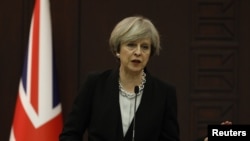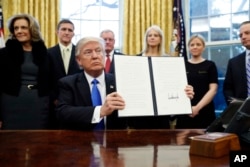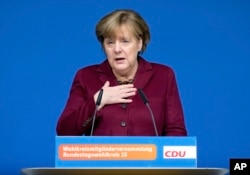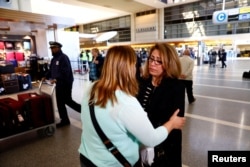International reaction to U.S. President Donald Trump's executive order banning entry to refugees and citizens from seven mostly-Muslim countries has begun.
In addition to barring residents of Iraq, Syria, Iran, Sudan, Libya, Somalia and Yemen from entering the U.S. for 90 days, the Trump executive order put a permanent ban on admission of Syrian refugees and a 120-day ban on all other refugees entering the U.S.
The president said that only people who support the United States should be allowed into the country. The executive order he signed discussed identification and verification procedures that U.S. consular officers should use in extensive detail.
"We want to make sure that we are not admitting into our country the very threats our soldiers are fighting overseas. We only want to admit those into our country who will support our country and love deeply our people," Trump said in announcing the ban.
A spokesman for German Chancellor Angela Merkel said Sunday that Merkel "is convinced that even the necessary, resolute fight against terrorism doesn't justify putting people of a particular origin or particular faith under general suspicion."
May faces criticism
Meanwhile, British Prime Minister Theresa May has been slammed by her fellow politicians for not condemning Trump's ban when she was in Ankara meeting with her Turkish counterpart Recep Tayyip Erdogan. May said in Turkey, "The United States is responsible for the United States' policy on refugees. The United Kingdom is responsible for the United Kingdom's policy on refugees."
Back in England, May said that Britain does "not agree" with Trump's ban on Muslims, adding that the approach was "not one we will be taking."
British lawmaker Heidi Allen said on social media that "Strong leadership means not being afraid to tell someone powerful when they're wrong ... I don't care how special the relationship is - some lines just shouldn't be crossed."
Another lawmaker Jeremy Corbyn said, "Theresa May should have stood up for Britain and our values by condemning [Trump's] actions. It should sadden our country that she chose not to ... After Trump's hideous actions and May's weak failure to condemn them, it's more important than ever for us to say to refugees seeking a place of safety that they will always be welcome in Britain."
Trump is scheduled to visit Britain later this year, but British lawmaker Sarah Wollston said the U.S.leader should not be invited to address Parliament, adding that "those who wish to fawn over him" could do that someplace else.
Other world reactions
French Foreign Minister Jean-Marc Ayrault said of Trump's ban, "Welcoming refugees, who flee war and oppression, is part our duty."
Ayrault's German counterpart Sigmar Gabriel said, "The United States is a country where Christian traditions have an important meaning. Loving your neighbor is a major Christian value and that includes helping people."
Retno Marsudi, the foreign minister of Indonesia, which has the world's largest Muslim population, but was not included in the nations whose citizens face restrictions for entering the United States, told Reuters in a social media message, "We have deep regrets about the policy."
Iran on Saturday announced it will bar all U.S. citizens from entering the Islamic republic in retaliation for the curbs on citizens from its country. "Unlike the U.S., our decision is not retroactive. All with valid Iranian visa will be gladly welcomed," Foreign Minister Mohammad Javad Zarif said.
Canadian Prime Minister Justin Trudeau took to Twitter to express his country's attitude towards refugees. He tweeted, "To those fleeing persecution, terror & war, Canadians will welcome you, regardless of your faith. Diversity is our strength. #Welcome to Canada."
The Canadian leader also tweeted a photograph of himself greeting a Syrian child at Toronto's airport.

















